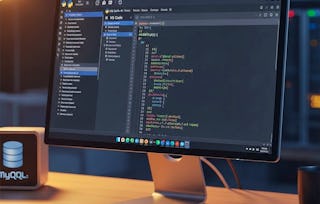In this course, you will learn how Django communicates with a database through model objects. You will explore Object-Relational Mapping (ORM) for database access and how Django models implement this pattern. We will review the Object-Oriented (OO) pattern in Python. You will learn basic Structured Query Language (SQL) and database modeling, including one-to-many and many-to-many relationships and how they work in both the SQL and Django models. You will learn how to use the Django console and scripts to work with your application objects interactively.

Building Web Applications in Django

Building Web Applications in Django
This course is part of Django for Everybody Specialization

Instructor: Charles Russell Severance
56,201 already enrolled
Included with
785 reviews
What you'll learn
Describe and build a data model in Django
Apply Django model query and template tags/code of Django Template Language (DTL)
Define Class, Instance, Method
Build forms in HTML
Skills you'll gain
Details to know

Add to your LinkedIn profile
8 assignments
See how employees at top companies are mastering in-demand skills

Build your subject-matter expertise
- Learn new concepts from industry experts
- Gain a foundational understanding of a subject or tool
- Develop job-relevant skills with hands-on projects
- Earn a shareable career certificate

There are 6 modules in this course
We cover the concept of the Model-View-Controller (MVC) in web applications.
What's included
4 videos4 readings1 assignment
This section explores how we define models in Django and then we build the data models and explore the administration interface for our application. Data models are how Django interacts with the underlying database to store and retrieve data.
What's included
5 videos1 reading1 assignment1 app item
Views are the aspect of Django applications that produce the web pages that are shown to our users. Views are one of several core elements of Django applications.
What's included
9 videos1 reading2 assignments1 app item
We review Python Object Orientation and look at the generic views capability within Django.
What's included
6 videos2 readings1 assignment
We use generic views by extending Django classes to make a new view class.
What's included
2 videos1 assignment
We cover how GET and POST work, how forms are constructed from HTML, how we protect our applications against Cross-Site Scripting Forgery (CSRF), and how we handle browser refreshes after POST.
What's included
8 videos3 readings2 assignments1 app item
Earn a career certificate
Add this credential to your LinkedIn profile, resume, or CV. Share it on social media and in your performance review.
Instructor

Offered by
Explore more from Mobile and Web Development
 Status: Free Trial
Status: Free Trial Status: Free Trial
Status: Free TrialUniversity of Michigan
 Status: Free Trial
Status: Free Trial Status: Preview
Status: Preview
Why people choose Coursera for their career

Felipe M.

Jennifer J.

Larry W.

Chaitanya A.
Learner reviews
- 5 stars
79.49%
- 4 stars
13.75%
- 3 stars
4.20%
- 2 stars
1.14%
- 1 star
1.40%
Showing 3 of 785
Reviewed on Apr 7, 2021
I just completed the second course of the specilization, really loved it. Can't wait to start the next one.
Reviewed on Jan 24, 2021
Great Course .Learned a lot of things and doing assignment with documentation helps to learn Django more effectively
Reviewed on Feb 9, 2021
It was a great challenge this time, getting familiar with things and understanding how to debug an issue/ thank you

Open new doors with Coursera Plus
Unlimited access to 10,000+ world-class courses, hands-on projects, and job-ready certificate programs - all included in your subscription
Advance your career with an online degree
Earn a degree from world-class universities - 100% online
Join over 3,400 global companies that choose Coursera for Business
Upskill your employees to excel in the digital economy
Frequently asked questions
To access the course materials, assignments and to earn a Certificate, you will need to purchase the Certificate experience when you enroll in a course. You can try a Free Trial instead, or apply for Financial Aid. The course may offer 'Full Course, No Certificate' instead. This option lets you see all course materials, submit required assessments, and get a final grade. This also means that you will not be able to purchase a Certificate experience.
When you enroll in the course, you get access to all of the courses in the Specialization, and you earn a certificate when you complete the work. Your electronic Certificate will be added to your Accomplishments page - from there, you can print your Certificate or add it to your LinkedIn profile.
Yes. In select learning programs, you can apply for financial aid or a scholarship if you can’t afford the enrollment fee. If fin aid or scholarship is available for your learning program selection, you’ll find a link to apply on the description page.
More questions
Financial aid available,

